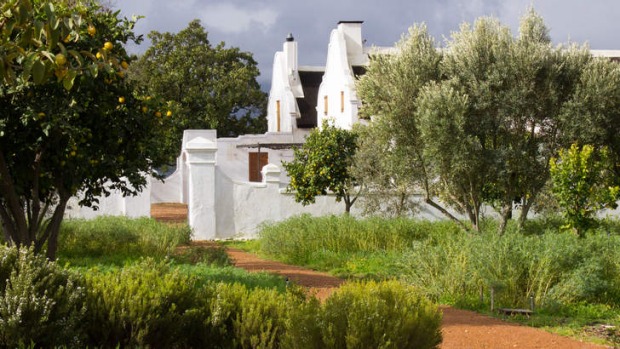
Two restored farms are changing the culinary landscape.
In a converted cattle stall, beneath a striking two-metre high bull's head tile mural, executive chef Stefan Danz brings out an exquisite "red salad" that looks like a mandala.
Created from slices of guava, beetroot, radish, pink pickled turnips and tomatoes, decorated with edible violets and pomegranate seeds, the salad is served with curls of smoked trout and creme fraiche. This is no ordinary cattle stall. This is Babel, the glass-walled restaurant of one of the world's most trendy designer hotels, Babylonstoren (Tower of Babylon).
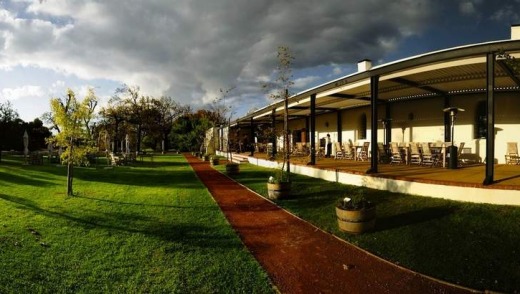
Situated on a 17th-century Cape Dutch wine farm amid jagged peaks near Franschhoek, the modern restaurant looks out on gabled farmhouses on one side and a burgeoning organic herb, fruit and vegetable garden on the other.
The eight-hectare garden, with more than 350 varieties of edible, medicinal and scent plants, is partly surrounded by old white-washed walls, some of which are softly rounded like meringues.
While the formal garden fits perfectly with the historic buildings, it was designed just four years ago by French architect Patrice Taravella. It is from this garden of delights that Danz and his team gets fresh ingredients.
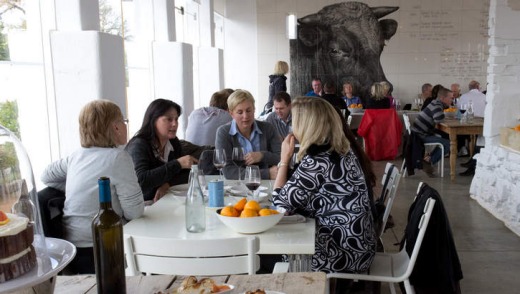
"Every night I send an email to the gardeners and at 7am they bring in what I want," Danz says. "When we want to do the specials of the day or something weird and wonderful, we go into the garden with a basket and pick what we need."
After relishing the delicate red mandala, I try Danz's clementine and toasted coriander lamb cutlets, with chardonnay sauce and rhubarb. It is one of the 10 best dishes I have ever eaten, the sauce rich with subtle fruit flavours.
The once dilapidated Babylonstoren farm was bought by South African media mogul Koos Bekker and his wife Karen Roos, a former Elle Decoration editor, six years ago. Now almost every aspect of the property looks as if it has been set up for a designer shoot. The layout of the gardens was inspired by the historic Company Gardens, established in Cape Town by the Dutch in 1652 to feed passing sailors, as well as by the legendary Gardens of Babylon.
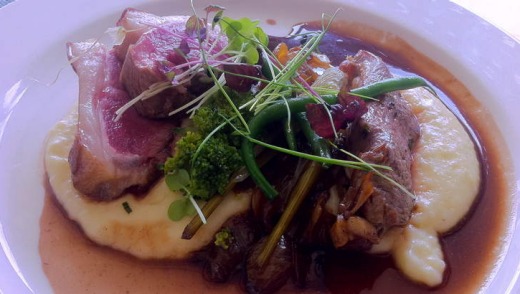
Exploring the gardens is a sensory delight. Beds of grey-leafed lavender are set against rectangular ochre-walled ponds full of indigenous waterblommetjies - flowering Cape pondweeds that are used for a famous South African bredie or stew. Espaliered plum trees with delicate blossoms frame views of distant peaks. Three turkey cocks with warty red necks strut pompously beneath laden lemon trees.
I meet the gracious, perfectly coiffed Karen Roos in the hotel lounge, a converted cattle barn lit by skylights and filled with interesting objects, including life-size raffia lion heads woven by a Zimbabwean refugee.
"When we bought the farm six years ago, there were these beautiful spaces, beautiful buildings that hadn't been restored in the wrong way," she says.
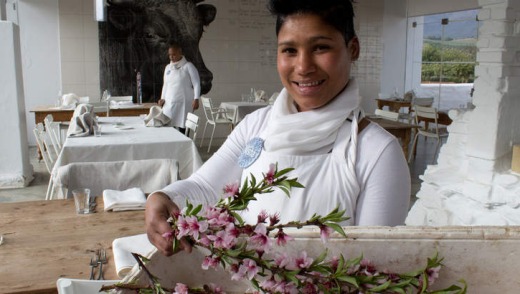
While the buildings were crumbling and rubble had built up in some of them, "the outside of the buildings were just so wonderful with all the patina of centuries".
The couple set about restoring the A1 heritage-listed buildings; turning the smithy into a bakery, wine-tasting room and charcuterie; and rebuilding collapsing farm labourers' cottages as accommodation for hotel guests. Glass-walled kitchens were added to some cottages, so guests could prepare their own food using produce they picked themselves in the garden.
Roos says though the garden was inspired by the past, it also looks to "the future where what people want is a very small footprint and food grown very close to where we eat, to be as organic as possible".
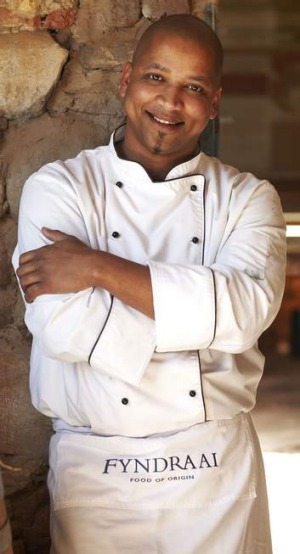
Just 15 minutes away at Solms-Delta, another historic wine farm, a two-hectare fynbos culinary garden is starting to flourish. It is part of an extraordinary transformation of the farm by the owner, renowned neurosurgeon Professor Mark Solms.
I meet the charismatic, blue-eyed Solms, author of the best-seller The Brain and the Inner World and professor of neuropsychology at the University of Cape Town, outside the farm's Fyndraai Restaurant. We look out over a vista of green lawns and vineyards to snow-tipped mountains. The place seems idyllic but has a nightmare past of slavery, apartheid injustice and poverty. He says when he bought the farm in 2001, he found six of the seven farmworkers and their extended families living without hot water or electricity in the old wine cellar. "And this was a cesspit, this lawn ..."
Solms, who previously worked as a neurosurgeon at a Soweto hospital, left South Africa for London in 1988 to avoid conscription. The brilliant academic returned in 2001, because he was intensely homesick and wanted to transform Solms-Delta.
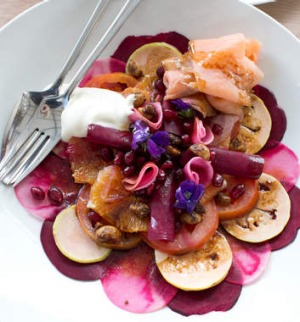
His family had invested in the farm four generations ago but never lived there. The farm was under a different owner and almost bankrupt when Solms bought out the creditors. The new owner met with each of his employees and their families, explaining he intended to transform the farm in line with the new, post-apartheid South Africa and asked for their ideas. Instead of responding, they looked away, "intimidated, confused, daunted". Solms says it was "excruciating, a nightmare".
In an attempt to diagnose what was wrong, he brought in archaeologists and historians to uncover the farm's history. The results of their findings, including individual plaques commemorating each of the 200 slaves once kept captive on the farm, are now housed in the Museum van de Caab, inside the old wine cellar.
Farm worker Benny Daniels was digging with the archaeologists, metres from the farmhouse, when they uncovered the remains of a 5000-year-old settlement including exquisite, microlithic stone tools. Daniels turned to Solms and told him: "You see professor, my people were here before yours." Like others, he became proud of his heritage.
Solms realised the fatalism of his employees was because their entire family and community culture was "shaped by apartheid and behind that nearly 200 years of slavery and behind that the dispossession and genocide".
As a privileged white who benefited from the system, he wanted to help fix things.
So Solms and philanthropist Richard Astor, a close friend and neighbour, put up their two farms as collateral to buy a third, adjoining farm for the workers. The new property is held by a special Wijn de Caab Trust, set up in 2005 to benefit everyone who worked or lived on the three farms and was "disadvantaged by apartheid". Through the trust, the workers now have one-third equity in the land and get a third of the profits from the wines sold.
Trust funds are used to renovate and build new houses for the workers, sponsor education and for projects that redress inequities and offer new opportunities.
Johan O’Rayn, garden manager at Solms-Delta, says: "We changed the whole farm so we could share."
He shows me around the culinary garden, which has 400 species of "herbs and plants that were used by the Khoi until the early European settlers' time".
In a nearby field are spotted Sanga cattle and sheep, sporting tails that look almost as if they have hot water bottles stuffed in them. O’Rayn says these are thick-tailed sheep that the Khoi brought to the area about 2000 years ago.
In the centre of the garden are rows of newly harvested indigenous melons: watermelon-size makataans used for jam and small, bitter tsama melons, used as a source of water by San people.
O’Rayn squeezes purple juice from wild olives, used as black paint in ancient rock art, offers me minute wild figs to taste and shows me glistening red tortoise berries. Many of the plants are used by chefs at the Solms-Delta's Fyndraai Restaurant to prepare "genuine Cape food" that draws on Khoi, Afrikaner farmer and Cape Malay slave traditions.
At the restaurant, I have a starter of plump scallops with a sweet "ballerja sauce", flavoured with sprigs of zingy lemon buchu. I savour springbok served with wild herbs and dried apricots.
As the waitresses walk by, the glass floor of the restaurant vibrates slightly. It is the tremble of history, for beneath the glass are the spotlit foundations of the original farmhouse. The bitter past is still present, but in Solms' view: "This piece of South Africa, this 76 hectares, is transformed."
TRIP NOTES
GETTING THERE
Qantas has a fare to Cape Town for about $1890 low season return from Sydney including tax. Fly to Johannesburg (14hr) and then to Cape Town (2hr 10min with South African Airways). Melbourne passengers pay about the same and fly Qantas to Sydney to connect; see qantas.com.au.
Both farms are near Franschhoek, about an hour’s drive from Cape Town.
STAYING + EATING THERE
Babylonstoren hotel: Babel restaurant is open for lunch Wednesday to Sunday, dinners Friday and Saturday. Garden tours 10am daily. Bookings essential.
Accommodation is from from $395 a cottage a night for two people. See babylonstoren.com.
Solms-Delta: Fyndraai Restaurant is open daily for lunch. Garden or archaeology, history and wine tours are available by arrangement. Bookings required.
See solms-delta.co.za.
MORE INFORMATION
country.southafrica.net/au/Australia.